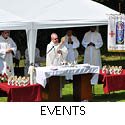
Our reflection below has been written by Fr Kevin Alban. Fr Kevin is the Prior Provincial of the British Province and originally wrote these reflections for a separate initiative at the Shrine. We are very grateful to him for letting us publish it more widely.
I
Saint Jude was one of the Twelve chosen by Jesus. What does this mean in practice? He was selected to be with Jesus on his mission and he was called to be sent out by Jesus.
Tradition has it that Saint Jude preached and ministered in Judea, Samaria, Idumaea, Syria, Mesopotamia and Libya. Being with Jesus and seeing him at work in the Holy Land is a fundamental qualification for being a disciple in the New Testament. Clearly, we cannot see Jesus physically today as Jude could. Yet we see Jesus in the form of bread and wine in the Eucharist and we see him in our neighbour.
How can we continue the work of Saint Jude and the Apostles in our everyday life? How does Jesus show himself in your life?
II
Saint Jude was sent out by Jesus, although the scene itself is not recorded. The name “apostle” means one who is sent. Jesus’ message is not to be kept secret but spread and shared. This is an extension of Jesus’ own mission and becomes a permanent state of the Church’s life after the Ascension and Pentecost. The disciples move out from the Upper Room to the known world. Their task is to teach, to preach, to heal, to attend to the needy and to carry the Good news to the world.
The task of the disciple that Saint Jude teaches us is to get to know the Lord in prayer and reflection and to participate in the mission of the Church.
Let us ask Saint Jude to be with us and pray with us as we undertake this task today. How can we participate in the mission of the Church?
III
It seems clear that Jesus chose these men specifically and deliberately: “I have called you, not you me”, he says quite severely almost. This also points to a fundamental truth in our lives that we owe everything to the Lord, that we cannot be anything without him. The number of apostles is important too.
These twelve men are called to sit on twelve thrones to judge the twelve tribes of Israel. In Jesus’ time the twelve tribes no longer existed, but their image exercised a powerful influence over the hopes and aspirations of the people. One of the signs of the restoration of Israel would be the renewal of the twelve tribes.
What can you thank the Lord for? How can we do better? Think about someone you are thankful to know.
IV
The role of the apostles was to be the closest group around Jesus and to bear witness to his teaching and ministry. Their closeness to Jesus meant that they were able to receive a more detailed explanation of Jesus’ instruction and to ask questions of him. They had a deep and close relationship with the Lord, sharing everything and conversing with him on all sorts of subjects.
They enjoyed exactly the relationship that Saint Teresa of Avila describes when she says prayer is nothing more than a conversation with the one who loves us most. Saint Jude is one who can show us what it means to have a prayerful life with Jesus.
Why don’t you have a conversation with God today? How can we help each other through prayer?
Let us pray..
O glorious apostle, Saint Jude Thaddeus, true relative of Jesus and Mary, I salute you and praise God for the honour of his saints. I praise and thank God for all the graces He has bestowed upon you and the apostles, and through you, upon the Church.
In humility I implore you to pray for me before God, looking upon me with compassion. Oh, despise not my poor prayer; let not my trust be confounded! To you God has granted the privilege of aiding humankind in the most desperate cases. Oh, come to my aid, that I may praise the mercies of God.
All my life I will be grateful to you and will be your faithful client until I can thank you in heaven.
Amen














